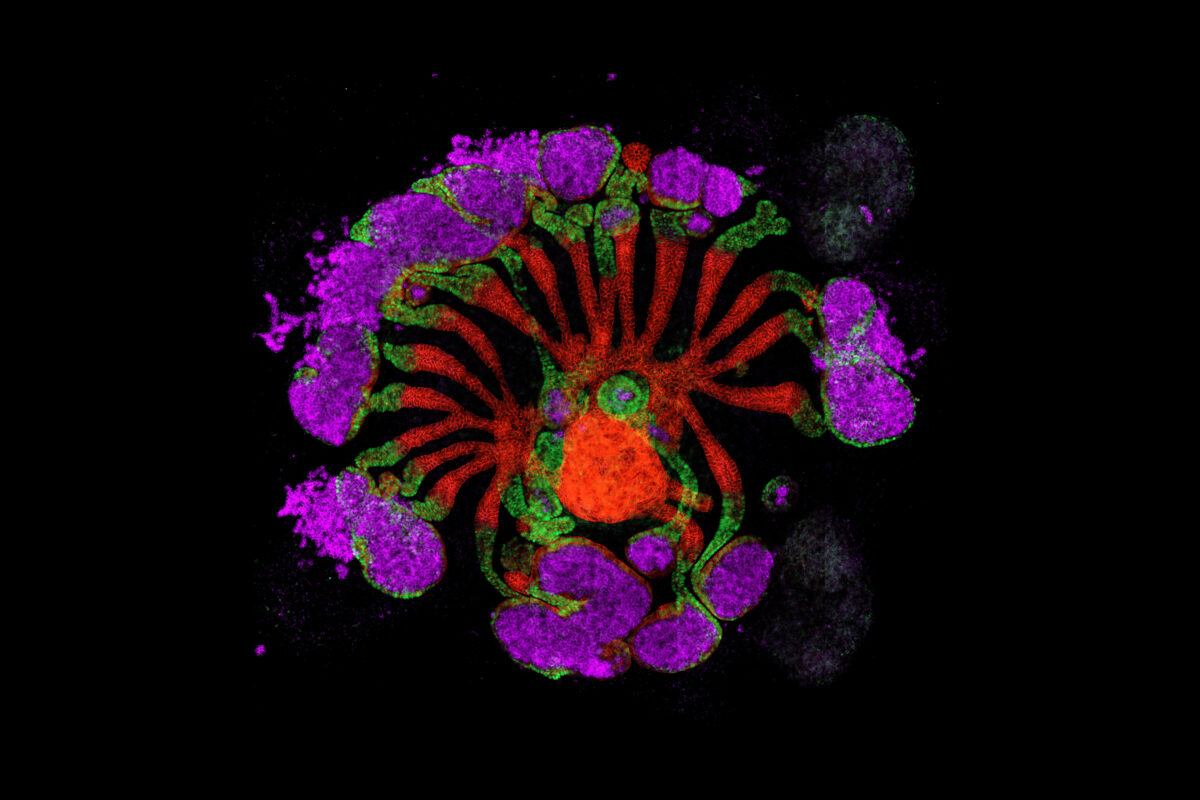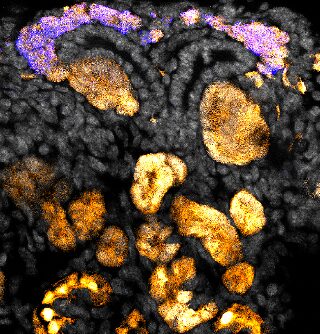
Scientists combine kidney filtering and urine-concentrating components to create “assembloids,” the most mature and complex kidney structures ever grown in a lab and a tool for developing new therapies.
A USC Stem Cell-led research team has achieved a major step forward in the effort to build mouse and human synthetic kidneys. In a new paper published in Cell Stem Cell, the scientists describe generating more mature and complex lab-grown kidney structures, or organoids, than ever before.
“This is a revolutionary tool for creating more accurate models for studying kidney disease, which affects one in seven adults,” said corresponding author Zhongwei Li, associate professor of medicine, and stem cell biology and regenerative medicine at the Keck School of Medicine of USC. “It’s also a milestone towards our long-term goal of building a functional synthetic kidney for the more than 100,000 patients in the U.S. awaiting transplant—the only cure for end-stage kidney disease.”
Scientists from the Li Lab previously constructed organoids composed of nephrons, the kidney’s filtering units. They had also produced organoids resembling the kidney’s collecting ducts, which concentrate urine.
Now, led by first authors Biao Huang, Pedro Medina, and Zipeng Zeng from the Li Lab, and Jincan He from Tongji University in Shanghai, the team has successfully combined nephron and collecting duct components to produce what they have dubbed “assembloids.”
The scientists first optimized conditions for growing mouse and human assembloids in the lab. They then transplanted the mouse and human assembloids into living mice, where they further matured—growing larger, and developing connective tissue and blood vessels.
“By maturing the assembloids in the native environment of the body, we tapped into kidney progenitor cells’ natural ability to self-assemble,” said Li. “We believe this will be a key to succeeding in the complex endeavor of building functional synthetic kidneys.”
Both mouse and human assembloids exhibited kidney-like functions, such as blood filtration, the uptake of proteins such as albumin, the capacity to secrete kidney hormones, and early signs of urine production.
While previous kidney organoids only matured to an embryonic stage, the mouse assembloids achieved the same level of maturity as a newborn mouse kidney, based on gene activity and other benchmarks. Human assembloids also matured beyond the embryonic stage, although their precise maturity level could not be determined due to the lack of available newborn human kidney samples.
The study also provides a proof-of-concept that assembloids can serve as high-fidelity models for studying complex human kidney diseases. As an example, the scientists grew human assembloids from cells with a single genetic change—the loss of a functional PKD2 gene—that causes autosomal dominant polycystic kidney disease, a genetic condition where the kidneys develop multiple large cysts that impair their function. These diseased assembloids grew into large human kidney cysts in living mice and exhibited complex disease features such as inflammation and fibrosis, that could not be modeled before.
“Our study provides a powerful new tool for studying a wide range of complex kidney diseases,” said Li, “as well as strong foundation for engineering functional synthetic kidneys as a lifesaving option for the patients who need them.”
About the study
Additional authors are: Sunghyun Kim, Janet Romo, Kari Koppitch, Chennan C. Zhang, Georgina Gyarmati, Jinjin Guo, Tianyi Ma, Megan E. Schreiber, Cong Xu, Jessica Pham, Riana K. Parvez, Jackson Su, Mateo W. Xia, Danny El-Nachef, Charles E. Murry, Justin Ichida, Nils O. Lindström, Nuria M. Pastor-Soler, Kenneth R. Hallows, Janos Peti-Peterdi, and Andrew P. McMahon from USC; Yohan Park and Kurt Zimmerman from the University of Oklahoma Health Sciences Center; Ruslan Bohovyk and Alexander Staruschenko from the University of South Florida; Pierre-Emmanuel Yoann N’Guetta and Lori O’Brien from the University of North Carolina at Chapel Hill; Zhenqing Liu from City of Hope; Laura Perin from Children’s Hospital Los Angeles; Sanjeev Kumar from Cedars-Sinai Medical Center; and Cizhong Jiang from Tongji University in Shanghai.
Seventy percent of this work was supported by federal funding from the National Institutes of Health (NIH Director’s Award DP2DK135739; research grants DK054364, DK064324, DK123564, DK135290, and DK136802; and training grant T32HD060549). Additional support came from a Chan Zuckerberg Initiative seed network grant (CZIF2019-002430), the University Kidney Research Organization (UKRO), a Keck School of Medicine of USC Dean’s Pilot Award, a USC Stem Cell Challenge Award, and a California Institute for Regenerative Medicine (CIRM) Predoctoral Fellowship (EDUC4-12756).
Disclosures
McMahon is a scientific advisor or consultant for eGENESIS, Trestle Biotherapeutics, GentiBio and IVIVA Medical. Peti-Peterdi and Gyarmati are co-founders of Macula Densa Cell LLC, a biotechnology company that develops therapeutics to target macula densa cells for a regenerative treatment for chronic kidney disease. Macula Densa Cell LLC has a patent entitled “Targeting macula densa cells as a new therapeutic approach for kidney disease” (US patents 10,828,374 and 11,318,209). Li, Huang, Medina, Zeng, and McMahon have applied for intellectual property protection on technologies discussed here.
